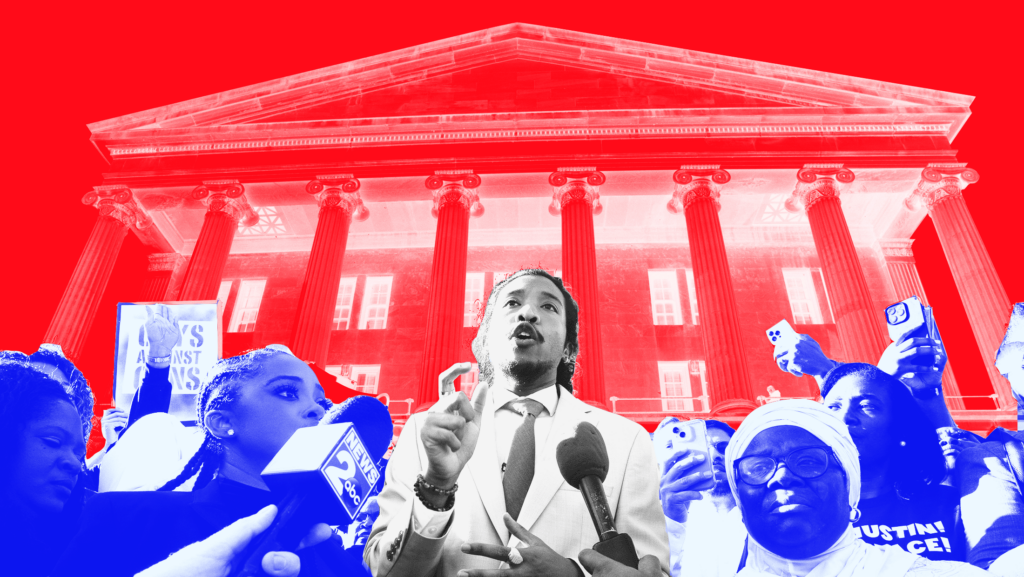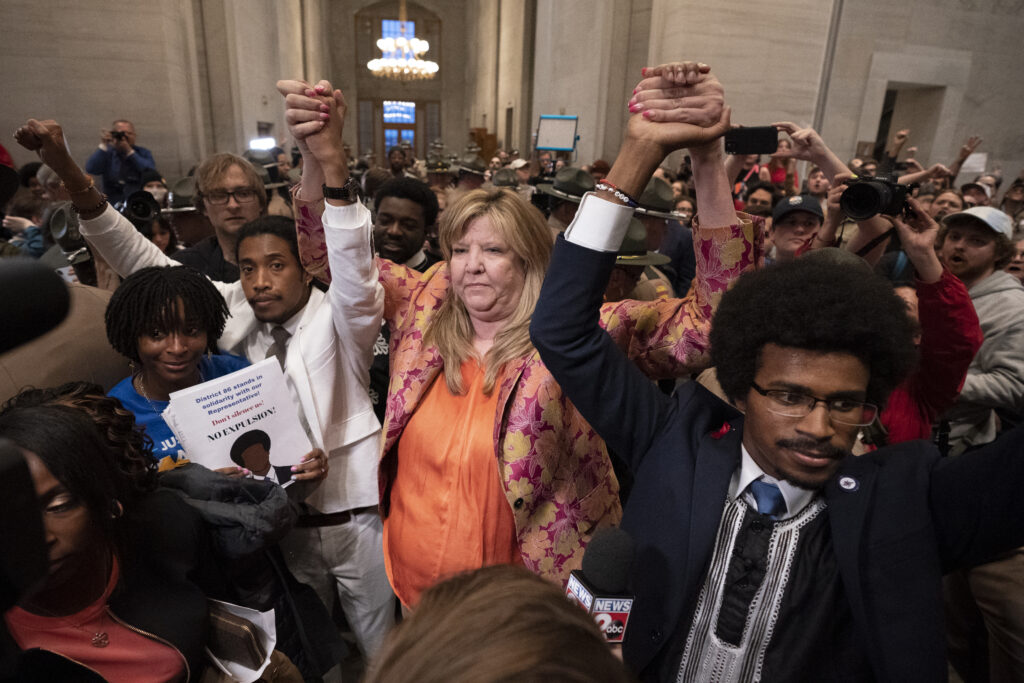The Depth of the Tennessee GOP’s Disdain for Democracy

“It is a party and it is a super majority that is drunk with power and the world saw yesterday: There’s no democracy in Tennessee. Our legislature is the opposite, it is autocracy and it should scare us all.”
These are the words of Nashville-based Rep. Justin Jones (D), a young, Black lawmaker in Tennessee who was expelled from the Legislature by his Republican colleagues for protesting in favor of gun safety legislation. The protest — and alleged breaking of decorum — came just days after a deadly mass shooting at an elementary school in Nashville. On April 6, Tennessee lawmakers ousted Jones, along with Memphis-based Rep. Justin Pearson (D), another young, Black lawmaker who protested as well.
The Assembly did not expel Rep. Gloria Johnson (D), a white woman who represents parts of Knoxville, even though she protested alongside Jones and Pearson. When asked why she wasn’t expelled, Johnson responded: “Well, I think it’s pretty clear. I’m a 60-year-old white woman and they are two young Black men.”

In rapid succession, the local councils in Nashville and Memphis sent Jones and Pearson back to the Tennessee Legislature. Even though the two lawmakers returned to their seats and residents regained representation, the high-profile incident brought Tennessee politics to the nation’s attention. The Legislature’s actions did not take place in a vacuum, but rather were indicative of a systemic disdain for representative democracy. Strict felony disenfranchisement policies, restrictive voting laws and partisan gerrymandering combine to create a system where power is so concentrated in the hands of the few that they feel emboldened enough to strip democratically elected officials of authority.
Republican state lawmakers have launched reactionary attacks targeted toward blue cities.
Just as Jones and Pearson were targeted by the Republican supermajority of the Tennessee Legislature, their respective cities have been subject to backlash over the last several months. “The legislature’s decision to expel two young Black men, Representatives Jones, and Pearson, shows how disconnected they are from the people in the state of Tennessee,” Councilmember Delishia Porterfield (D) told Democracy Docket in a comment. “It is also the latest example of state overreach and is an abuse of power.”
On Aug. 2, 2022, the Nashville Metro Council (a consolidated city and county government representing Davidson County and Nashville) voted against a proposal to host the 2024 Republican National Convention. The vote garnered pushback from Lieutenant Gov. Randy McNally (R) and other members of the Legislature. Since this move, Tennessee’s Democratic cities have come under a coordinated attack.
Early in the 2023 legislative session, Tennessee Republicans attempted to pass a bill that would have banned runoff elections in city government races. As critics have pointed out, this bill could have improved the chances of a Republican candidate prevailing in a mayoral race in Nashville.
In March, Gov. Bill Lee (R) signed a law that forces the Metro Council to reduce its membership by half. Two lawsuits were filed challenging the law — one by the Metro government and one by community leaders — and on April 10, a Tennessee court temporarily blocked portions of the law while litigation continues.
“From their attempt to slash the size of Nashville’s Metro Council to targeting our Community Oversight Board, Republican [legislators] are hell-bent on silencing the voices of anyone who has a voice that differs from theirs,” Porterfield emphasized.
After the expulsion of Pearson, who represents parts of Memphis, GOP legislators threatened to withdraw funding from important projects in Shelby County if Pearson was reappointed. In response, Pearson underscored the larger systemic issues of Republican reactionary politics: “The power structure in the state of Tennessee is always wielding against the minority party and people.”
In addition to attacking blue cities’ political power, the Republican supermajority has also tried to undermine Nashville’s economic autonomy. When asked about proposals to harm Nashville’s economic power, Porterfield explained that Tennessee is one of the worst states for preemption, the idea of a higher authority overruling the authority of a lower. She continued: “The state is currently looking at legislation to seize appointment power for both our Airport and Sports Authority, eliminating the power to investigate by Community Oversight Boards, kill Metro’s ability to get money from our convention center and preempting the charter requirement of 27 votes to demo at the fairgrounds.”
“I could not stop the General Assembly from dismembering Nashville”: The latest redistricting cycle eviscerated minority and Democratic representation.
In the latest round of redistricting, the Legislature divided Davidson County, home to Nashville, into three separate districts, dismantling the city’s Democratic-held seat. The lawmakers intentionally grouped the city’s Democratic-leaning voters with more rural, reliably Republican areas. Previously, Nashville had been kept intact in a single district for as long as Tennessee has been a state.
Rep. Jim Cooper (D-Tenn.), who represented Nashville in Congress for 20 years, announced his retirement soon after the new congressional map was enacted. “Despite my strength at the polls, I could not stop the General Assembly from dismembering Nashville. No one tried harder to keep our city whole,” Cooper wrote in a statement.
In a self-reinforcing cycle, the lawmakers who enacted the unfair congressional map also approved state legislative districts that entrenched Republican supermajorities in both chambers of the Legislature. (Notably, the recent expulsions were only possible because of the GOP’s supermajority control.)
A group of voters filed a lawsuit in February 2022 arguing that Tennessee’s state House and Senate maps violate the state constitution. “[T]he Tennessee General Assembly engaged in an unprecedented reapportionment of voters, redrawing state House and Senate maps to ensure maximum partisan advantage for the incumbent Republican supermajority,” the complaint begins. “Redistricting decisions were made largely out of view of the public and largely without input from representatives of the minority party. These one-sided decisions denied voters any real opportunity to participate in – much less stop – fundamental changes to the process through which Tennessee voters choose their elected representatives.” Litigation is ongoing before a trial court.
Tennessee denies voting rights to over 470,000 citizens.
If gerrymandering decides what electoral opportunities voters have, felony disenfranchisement decides who gets to vote at all. Tennessee has one of the strictest (and most complicated) felony disenfranchisement laws in the country: People lose voting rights for life if they were convicted of certain felonies before certain dates. Based on other qualifications, some individuals can petition for restoration after paying outstanding child support and court fees, among other requirements.
The result is over 470,000 citizens locked out of political participation, nearly 10% of Tennessee’s voting age population according to the Sentencing Project. More nefarious, the state disenfranchises 21% of its Black voting age population, the highest percentage in the country. It has the highest disenfranchisement rate for Latino residents as well.
According to ProPublica, only around 2,000 Tennesseans have successfully applied for rights restoration in the past two years. When ProPublica reporters asked Speaker of the Tennessee House of Representatives Cameron Sexton (R) about the fact that Tennessee is the only state that makes child support payments a requisite for rights restoration, Sexton responded: “Maybe Tennessee is doing it correctly and the others are not.”
The Tennessee Legislature’s priorities include suppressing voters.
Tennessee has a startlingly low democracy tally by the Movement Advancement Project, a nonprofit think tank that assigns scores to states accounting for voter registration requirements, representation and participation information, in-person voting requirements, mail-in voting requirements, election security and more. An academic study calculating the “cost of voting” — a measure for the relative ease or difficulty of voting in each state — ranked Tennessee 38 out of 50 in the country.
In the midst of a deadly and uncertain pandemic, Tennessee was one of just five states that made no changes to its mail-in voting rules and still required an excuse to vote by mail for the 2020 election; concerns over contracting COVID-19 was not an accepted excuse. Tennessee voters, the Tennessee NAACP and other groups challenged the state’s restrictive absentee voting guidelines, however the court largely declined to grant relief.
Instead of improving voting access, the Legislature’s priorities have included passing laws requiring state and local officials to consult with the legislative leadership before changing certain state election laws and prohibiting election offices from accepting any private grant for election administration.
In March, Sherrilyn Ifill, the former president of the NAACP Legal Defense Fund, wrote a prescient article about Republicans removing power from duly elected Democrats across the country: “And so the tactic we’re seeing is that they’re going directly for the power. Forget about the voting practices,” she recently reiterated.
Yet, in Tennessee, it was voting practices, disenfranchisement of one-fifth of the state’s Black population and skewed legislative majorities that enabled the recent expulsions. A crisis of democracy has been simmering in Tennessee for years, and the state is not alone. Tennessee provides a blueprint for how Republicans can capitalize on systemic failures in political participation to further consolidate control.
Ifill emphasized an unexpected and important takeaway from the incident: “In this rush to remove these two young men, I think the speaker did not anticipate that the whole nation would see it.”